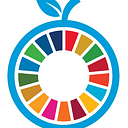“Powering Agriculture”: A Campaign for Sustainable Energy Food Systems
By Power for All
The global public identifies a small handful of actions as catalytic to ensuring delivery of the 17 UN Sustainable Development Goals (SDGs) by 2030. Among them: provision of nutritious food, energy and water.
With this year seeing the first-ever UN Food Systems Summit and the first UN High-Level Dialogue on Energy in 40 years, now is the time to ensure that the next decade is defined by close collaboration between the energy and food sectors.
The international network Power for All is laser focused on just that, through their Powering Agriculture campaign.
Power for All, which has the support of more than 300 partners, are working to accelerate joint action that bridges SDG2 (zero hunger) and SDG7 (clean energy).
The non-profit is doing that in three ways: 1) building an inter-sectoral coalition between clean energy and agriculture and food organizations, including public and private sector, civil society and funding; 2) aggregating and curating the best data and knowledge on the linkages between the two sectors and 3) facilitating country-level mobilization that identifies barriers to progress and works hand-in-hand to remove those barriers.
At the heart of the campaign is the role of decentralized renewable energy: solutions like standalone solar, renewable energy minigrids and efficient, appropriate productive use machinery that can be used by smallholder farmers and collectives in rural Sub-Saharan Africa and Asia for irrigation, agricultural processing, cold storage and access to markets.
“Our goal is not to create something new, but to build on the great work that’s already happening, but which is happening in silos and not aligned on a common outcome,” said William Brent, Power for All’s head of campaigns. “Facilitating data-driven cooperation at the country level is the key to accelerating progress and meeting the 2030 deadline.”
The stakes are high: in Sub-Saharan Africa, for example, agriculture on average accounts for 15% of national GDP, 52% of the region’s employment, yet its just 2% of total electricity consumption, irrigation is still mainly rain-fed and food waste significantly reduces farmer income. A major barrier to growth is electricity, as most rural areas lack reliable, affordable power. The gap is illustrated by the fact that the addressable market in the region for solar-powered irrigation, cold storage and agro-processing is $11.3 billion, but only $734 million of that market is serviceable because of farmers’ inability to pay.
Power for All is demonstrating the impact of their approach in India and Uganda to start, and plans to expand its work to other countries. The work in Uganda has resulted in a new data framework based on a geospatial meta-analysis (a comprehensive policy brief was recently published), looking at the intersection of high-impact areas where food productivity potential is high, but lack of electricity access is low. It has also established a “Collaboration Accelerator,” a platform for inter-sector, multi-stakeholder cooperation that is developing a coordinated approach to prioritizing market acceleration.
Success is critical: rural populations in Africa and Asia are the most vulnerable to climate change, and COVID-19 has also uncovered deeper vulnerabilities. Building a resilient, clean energy infrastructure to guarantee food security is at stake.
To learn more, visit www.powerforall.org/campaigns/poweringag or email contributor@powerforall.org
Upcoming event: On 20 January 2020, a Ministerial Meeting in support of the UN Food Systems Summit and summit-level High-Level Dialogue on Energy preparatory processes will take place in partnership with the International Renewable Energy Agency (IRENA) and the United Arab Emirates as part of Abu Dhabi Sustainability Week and the IRENA Assembly. The Ministerial Meeting is intended to raise awareness of the Summits and identify potential outcomes — such as initiatives, targets, policies, and other concrete deliverables — with simultaneous food, energy, and climate benefits that can be considered for both Summits, as well as COP26. Find our more
The views and opinions expressed in this blog are those of the author and do not necessarily reflect the official policy or position of the United Nations Food Systems Summit.
